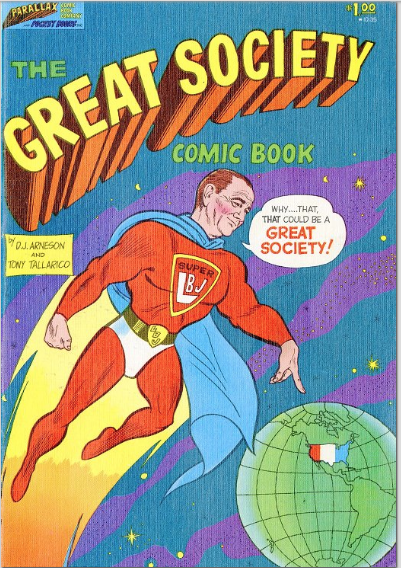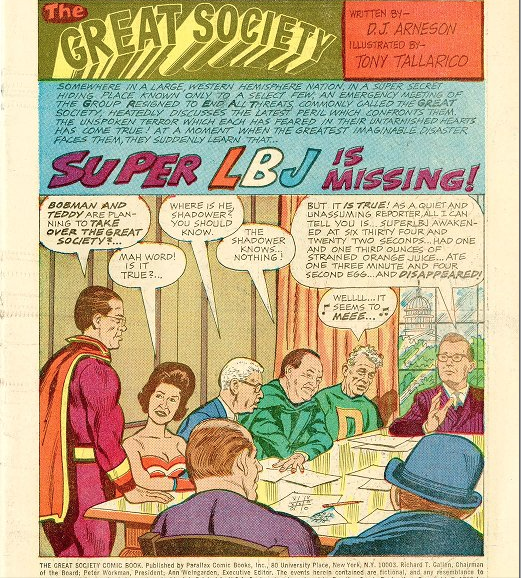1960s
“The Great Society” Comic Book
Read the whole thing here.

Posted By: Paul - Tue Feb 02, 2021 -
Comments (2)
Category: Humor, Parody, Politics, Comics, Superheroes, 1960s
How to Succeed With Brunettes
Posted By: Paul - Sun Jan 31, 2021 -
Comments (0)
Category: Annoying Things, Antisocial Activities, Customs, Emotions, Etiquette and Formal Behavior, PSA’s, 1960s, Men, Women
Operation Decoy - the song
In August 1962, New York City cops patrolled the streets while dressed as women in order to trap muggers. They called this Operation Decoy.I didn't realize, when I posted about Operation Decoy two years ago, that it had inspired a song.
More info: Discogs

Posted By: Alex - Sat Jan 23, 2021 -
Comments (0)
Category: Music, Police and Other Law Enforcement, 1960s
The Magic Land of Allakazam: Mark Wilson, RIP
The Wikipedia page.Alas, Mark Wilson is no more.
To Our Magical Friends...
Dad always said, “The best kind of legend to be is a Living Legend”. But sadly, as of Tuesday, January 19th at 4:40pm, Husband of Nani, Father of Mike & Greg, Legendary Magician, Author, Producer, and so much more… James Mark Wilson transitioned from our earthly existence to the ethereal.
Wishing to be with his family, he shared his love, bright outlook, and ambitions for the future, then he passed quietly, without pain, or a single complaint, comfortably at his home with Nani and his boys by his side.
Mark Wilson, the name by which he is best known, was born in Manhattan, New York on April 11th, 1929, in the loving arms of his mother Francis (Teta) Wilson and father James (Jimmy) Wilson. His parents raised him during the Great Depression and through WWII. By example, they taught him to preserver through difficult times and overcome obstacles with determination. His mother, Teta, often said, “Don’t worry honey, it will be alright.” Mark developed a “never give up” attitude, and learned that kindness, compassion, and love were the most important things in life.
He spent his over 91 years on Earth, sharing his passion for making people happy through the art of magic by blazing new paths to reach audiences around the world.
Mark’s trademark phrase, “Happy Magic” was his and Nani’s sign-off words for countless live and television performances… “Happy Magic” is how he signed autographs… and “Happy Magic” was his own unique friendly and approachable style of performing.
Mark’s creativity, originality, and leadership were based on respect and honor for others. Mark finished on “the right side of magic history” morally and ethically. With his loving wife Nani Darnell at his side, he achieved a longer list of “Historic Firsts” than many dream of in multiple lifetimes.
MAGIC Magazine named Mark Wilson, “One of the Ten Most Influential American Magicians of the 20th Century.”
Mark’s influence is still evident today, as he was so thankful to hear “Mark Wilson” and the Magic Land of Allakazam referenced in the newly released feature film, One Night in Miami.
Whether you know him from his TV appearances, his Live productions, the Mark Wilson Complete Course in Magic book, or one of his many in-person Magic University classes at the Magic Castle, or through one of his many other achievements… Mom and Mike and I are so proud that he brought “Happy Magic” into not only your life, but the lives of more people around the world than he could possibly meet.
"A lifetime of magic has taken Nani and me around the world and helped us make friends everywhere." - Mark Wilson
He is already dearly missed,
Greg Wilson, on behalf of the Wilson Family
[email protected]
Posted By: Paul - Sat Jan 23, 2021 -
Comments (1)
Category: Magic and Illusions and Sleight of Hand, Television, 1960s
The Psychedelic Experience
Posted By: Paul - Fri Jan 22, 2021 -
Comments (4)
Category: Drugs, Psychedelic, PSA’s, Patent Medicines, Nostrums and Snake Oil, 1960s
The Frito Twist
NOTE: the text below calls it a 78, but it looks pretty much like a 45 to me.
This 78 rpm record was made by the PAMS (Production, Advertising, Merchandising Service) production company in February 1962 for the Frito-Lay company to promote its Fritos snack food with a dedicated jingle, the “Frito-Twist.” The disc’s white paper label bears the Fritos and PAMS logos on both sides. Side A plays “The Frito Twist,” and Side B contains the instructional “How to Twist.” (In earlier versions of this promotional record, side A featured “Dallas: My Home Town” with “The Frito Twist” on side B.) The music for the “Frito Twist” was written by Euel Box, a Dallas-based composer and arranger best known for his work on the “Benji” movies of the 1970s and 80s, and a music director for the PAMS company. The sound engineer on the recording was Dick McGrew (as noted in the fine print along the edge of the record).The Dallas-based PAMS production company was founded in 1951 by William B. Meeks, Jr., often credited as the creator of the musical station break. In the 1950s-1970s, advertisers looked to music and dedicated jingles to help promote their products. They aimed branded dance fads in particular at teenagers and young adults.
More info here.
Posted By: Paul - Wed Jan 20, 2021 -
Comments (6)
Category: Business, Advertising, Music, Junk Food, 1960s, Dance
Mary Mild
Disney released Mary Poppins in 1964. The next year Ivory Liquid Soap debuted a new mascot: Mary Mild, a flying maid. Seems like an obvious Mary Poppins rip-off to me, though I can't find the similarity mentioned anywhere.Mary Mild didn't last long. Within two years, Ivory had canned her.
The ads below ran in 1966 in magazines such as Ladies Home Journal and Good Housekeeping.



Posted By: Alex - Mon Jan 18, 2021 -
Comments (5)
Category: Advertising, Corporate Mascots, Icons and Spokesbeings, 1960s
Shrimpenstein
Wikipedia page of co-creator Jim Thurman. Obit for co-creator Gene Moss.IMDB page.
Posted By: Paul - Wed Jan 06, 2021 -
Comments (0)
Category: Humor, Parody, Television, Pop Art, 1960s, Fictional Monsters
Cheese-Filtered Cigarettes
We've previously posted about "cheese candy", which was the invention of Wisconsin lumberman Stuart Stebbings. Another of his inventions was cheese-filtered cigarettes. He was, apparently, a man driven to find new uses for cheese.
Lab tests demonstrated that a cheese filter could remove 90 percent of the tar in cigarettes. A hard cheese worked best, such as Parmesan, Romano, or Swiss. Although an aged cheddar could also be used. Or even a blend of cheeses.
In 1966, Stebbings was granted Patent No. 3,234,948. But as far as I know, his cheese-filtered cigarettes never made it to market.

Mason City Globe-Gazette - Feb 8, 1960
Posted By: Alex - Sun Jan 03, 2021 -
Comments (3)
Category: Food, Inventions, Patents, Smoking and Tobacco, 1960s
I am sitting in a room
An experiment in feedback and reverb by composer Alvin Lucier, 1969.It's a fairly famous piece of experimental music. But I wonder how many people have actually listened to the entire thing from start to finish, as opposed to skipping ahead to see how his voice changes.
More info: ubu.com
Posted By: Alex - Sat Jan 02, 2021 -
Comments (1)
Category: Music, 1960s

| Who We Are |
|---|
| Alex Boese Alex is the creator and curator of the Museum of Hoaxes. He's also the author of various weird, non-fiction, science-themed books such as Elephants on Acid and Psychedelic Apes. Paul Di Filippo Paul has been paid to put weird ideas into fictional form for over thirty years, in his career as a noted science fiction writer. He has recently begun blogging on many curious topics with three fellow writers at The Inferior 4+1. Contact Us |




